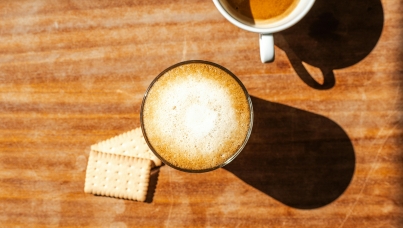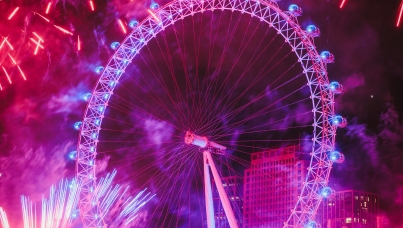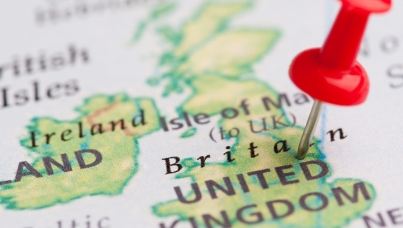Public image of Charles improves as he moves from Prince of Wales to King
- William and Catherine, the new Prince and Princess of Wales, and Princess Anne are the most popular Royals
- Prince Harry and Meghan, the Duchess of Sussex, and Camilla the Queen Consort also see improvements in their favourability ratings from earlier this year
In the period after the funeral of Queen Elizabeth II and the proclamation of King Charles III, the new monarch saw his favourability ratings improve compared with when he was Prince of Wales earlier this year. In March of this year, 43% said they viewed then-Prince Charles favourably, but by the end of September this rose by 11 points to 54% favourability towards him as King.
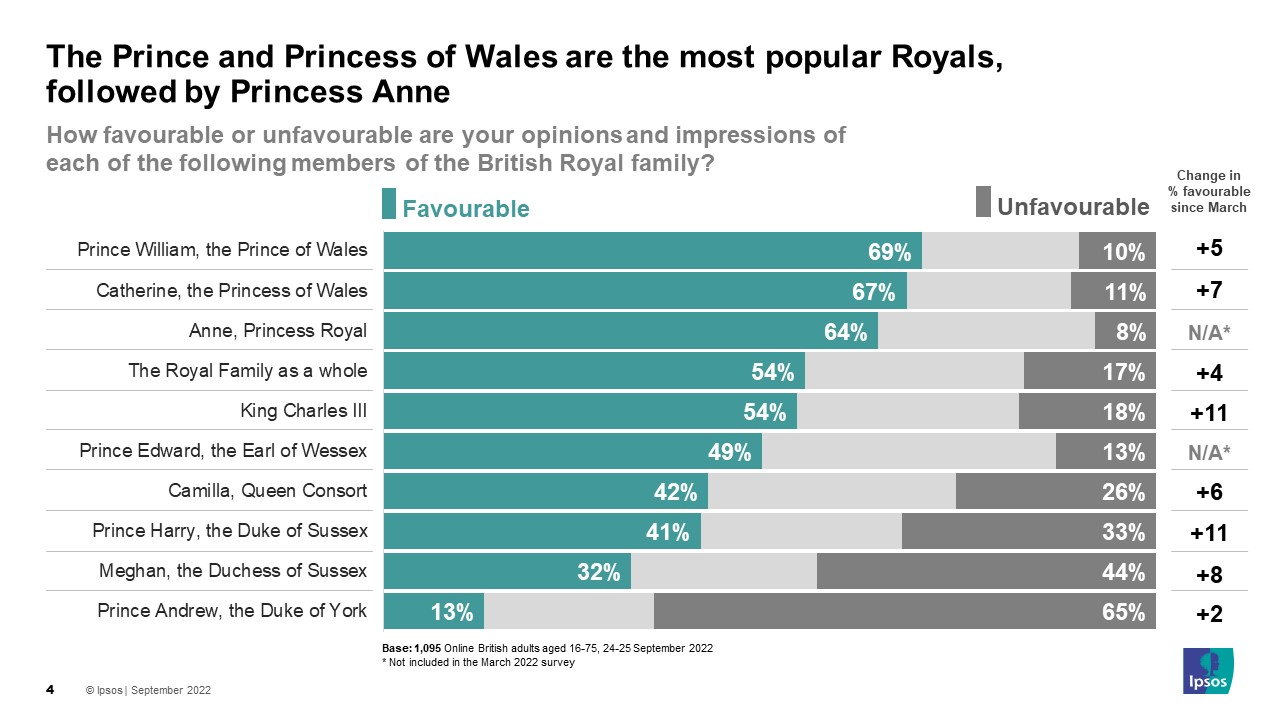
The Prince and Princess of Wales are most likely to be viewed favourably by Britons, and also see increases in their ratings. Almost 7 in 10 (69%, +5 since March) have a positive opinion of Prince William, while two-thirds (67%) say the same about Catherine, up from 60% in March. Princess Anne rounds off the top three with 64% favourable towards the Princess Royal.
Having been seen in the UK several times over the period of mourning, both the Duke and Duchess of Sussex have seen significant increases in the proportion of Britons who are favourable towards them. Now, Prince Harry is seen positively by 41% of Britons, up from 30% in March, while 32% feel the same way towards Meghan, up from 24%. However, Britons are still more likely to have an unfavourable impression of the Duchess (44%).
Just over half of Britons are positive towards the Royal Family as a whole, while 49% are favourable towards Prince Edward, the Earl of Wessex and 42% say the same for Camilla, the Queen Consort (her ratings also up 6 points since March).
Prince Andrew remains the most likely to be viewed unfavourably, almost two-thirds (65%) have this opinion and only 13% say the opposite, little changed from March.
Associations with the King and his family
Charles’ more detailed image ratings have also shown signs of improvement since becoming King. Britons are most likely to see King Charles II as traditional (38%), a good representative for Britain on the world stage (28%, up from 21% in May) and capable (27%, up 8pp).Around a quarter see him as understanding of the problems facing the British people (24%, also up 8pp) while 1 in 5 each say he is concerned about people in real need in Britain and out of touch with ordinary people (both 21%).
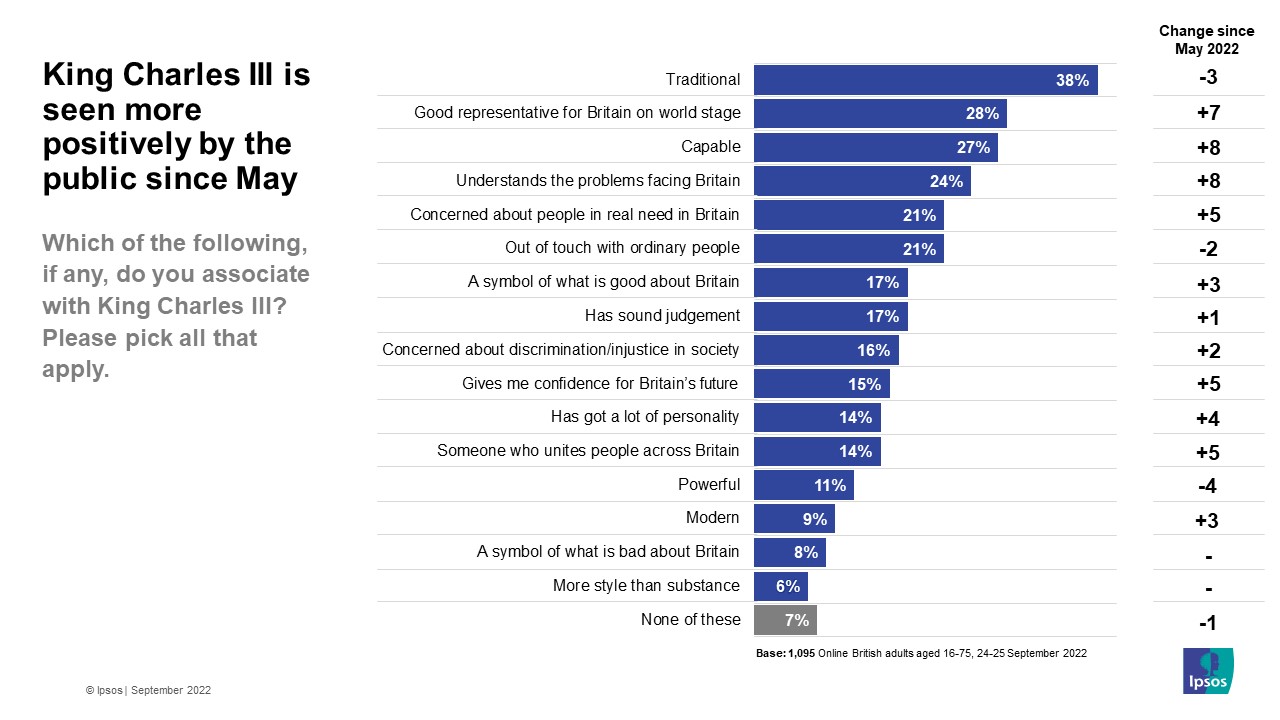
Looking at the Royal Family as a whole, Britons are much more likely to associate the UK with tradition because of it (57%) than any other trait given to respondents. One in 5 (20%) say it makes them think of the UK as powerful while 15% believe it shows the UK represents an unequal society.
What functions are important for the Royal Family?
Britons are most likely to see representing the UK at home and abroad as among the most important of the Royal Family’s functions (71% say this is important) while similar proportions see maintaining the continuity of British traditions, whichever party is government (70%) and uniting the people despite political, economic and class differences (68%) as important functions.
Around 6 in 10 say setting a standard of good citizenship and family life (62%) and ensuring the armed forces owe their allegiance to the Crown rather than to the government of the day (60%) are important purposes of the Family.
Just over a third (35%) believe an important role is distracting people from the real functions of the country while a similar proportion say the same for preserving the class system in Britain (36%). Just under half believe preserving a Christian morality in Britain is an important role of the Royal Family.
Kelly Beaver MBE, Chief Executive of Ipsos in the UK, said:
King Charles III settles into his new role with a boost to his favourability ratings after moving from Prince of Wales to King. In fact, many of the Royals see an improvement in their public perceptions from earlier this year, including the new Prince and Princess of Wales, William and Catherine, who along with Princess Anne make up the top three in the public’s affections. Prince Harry and Meghan, the Duchess of Sussex also see an increase in favourability, after returning to the country to join his family to pay their respects to Queen Elizabeth II.
Now that he has become King, Charles is also being increasingly associated with several positive traits such as “good representative for Britain on the world stage” and “capable”. The strongest association for both he and the Royal Family is of being “traditional” – while few see them as being modern. Although maintaining relevance with younger generations will be an ongoing priority, this view of the importance of tradition does chime with Britons’ expectations of the most important functions of the Royal Family – representing the UK at home and abroad and serving as an institution that can preserve traditions and unite people despite their differences – that continues even as we enter a new era of the British monarchy.
Technical note
- Ipsos interviewed a representative quota sample of 1,095 adults aged 16-75 in Great Britain. Interviews took place on the online Omnibus on 24th-25th September 2022. Data has been weighted to the known offline population proportions. All polls are subject to a wide range of potential sources of error.




